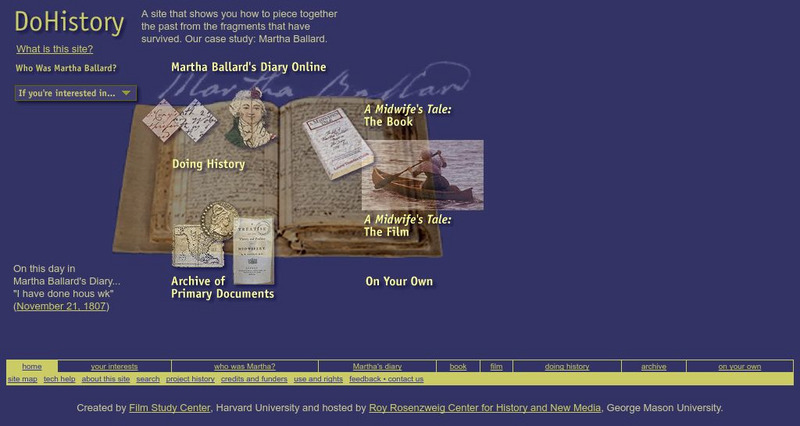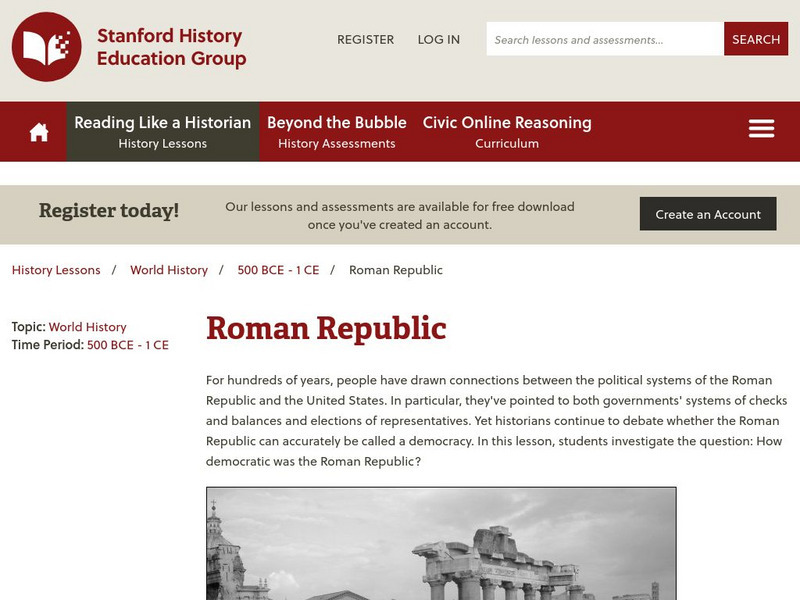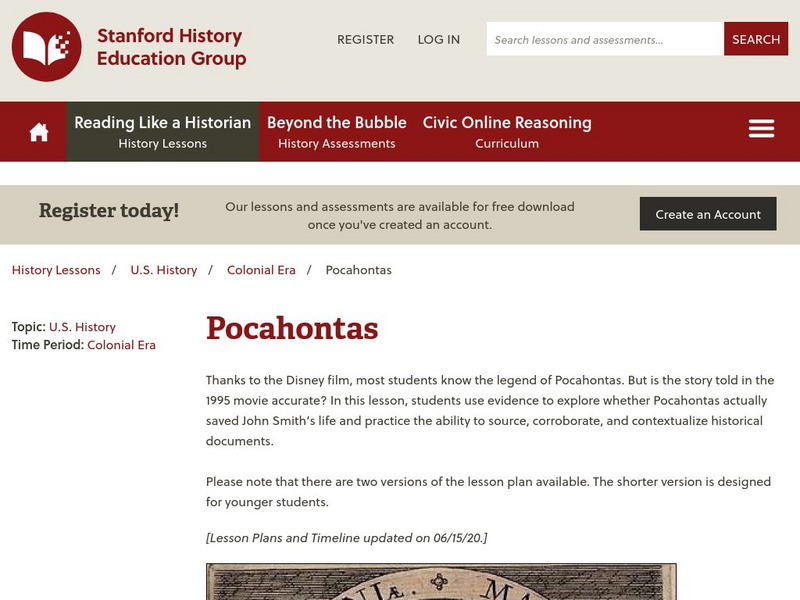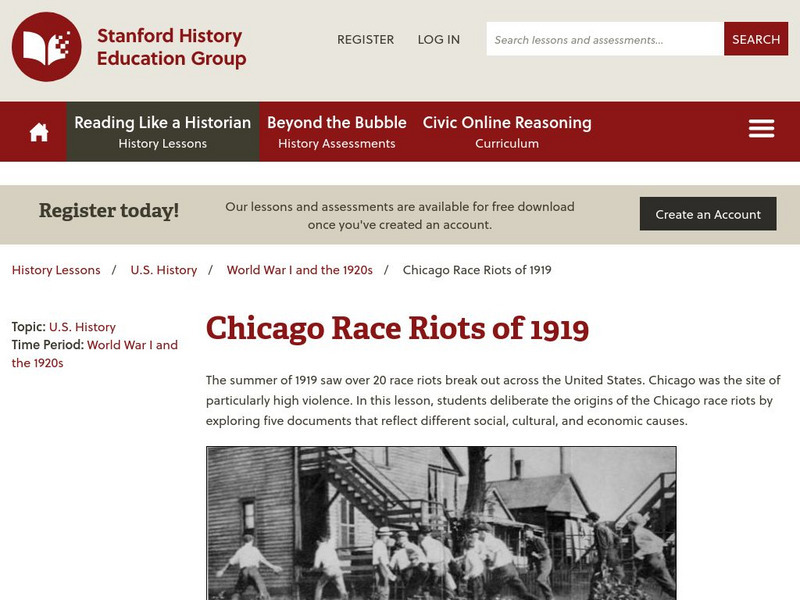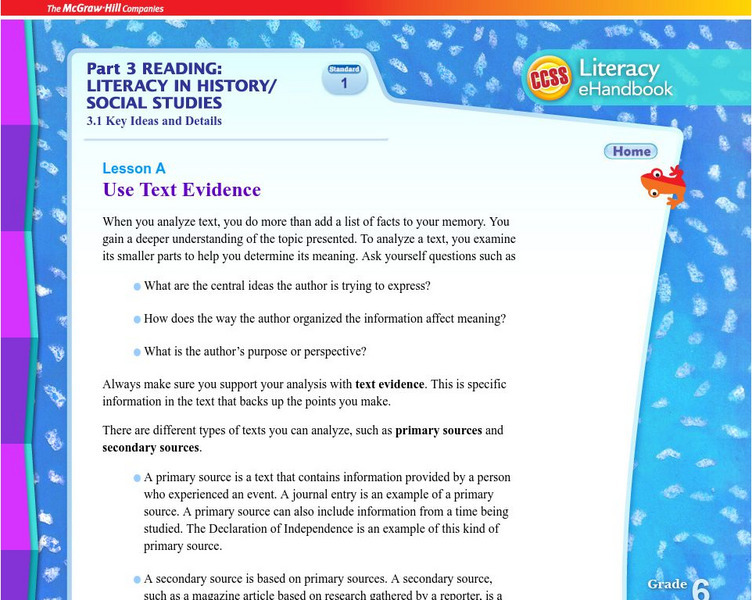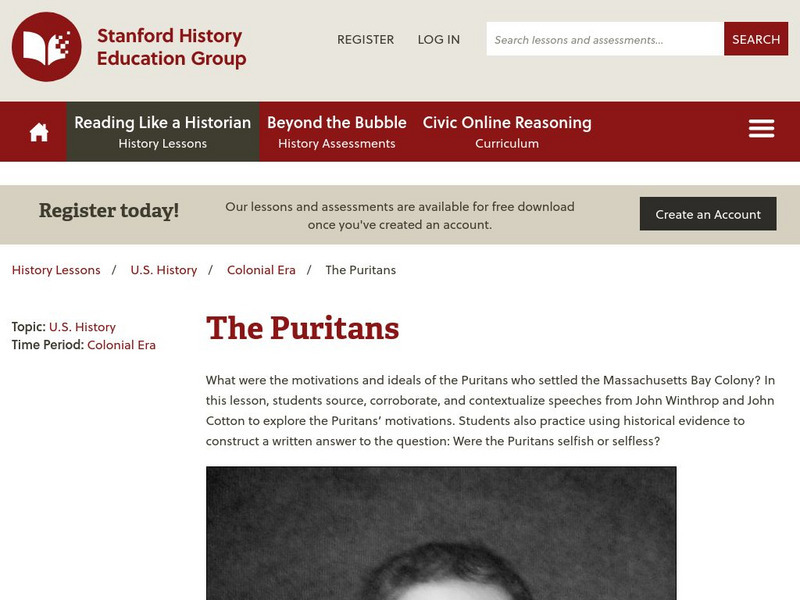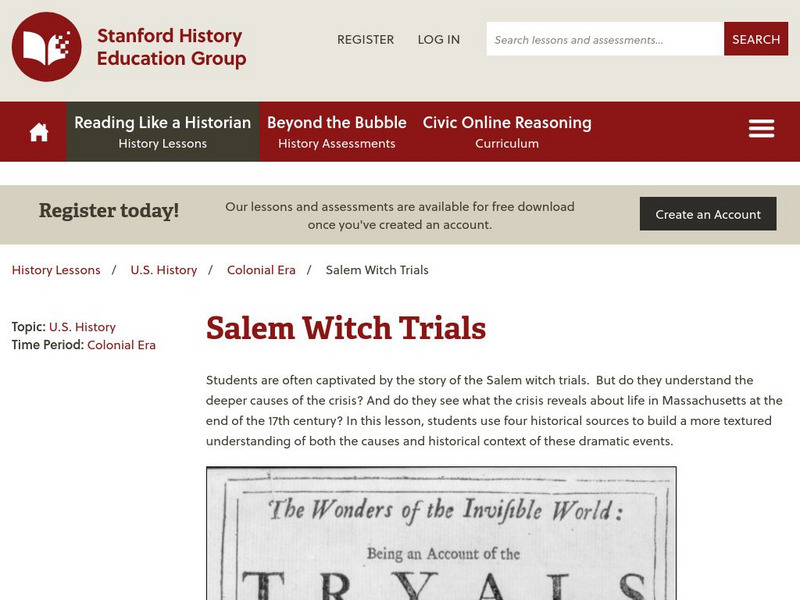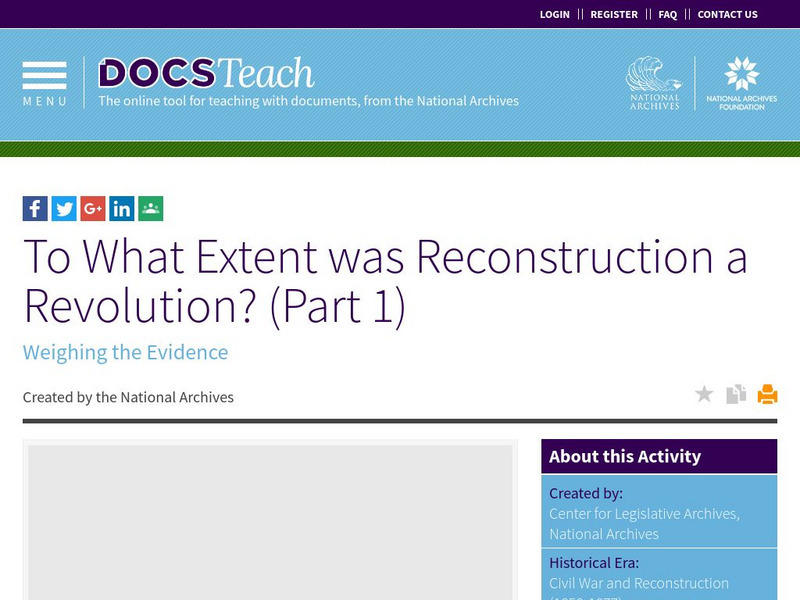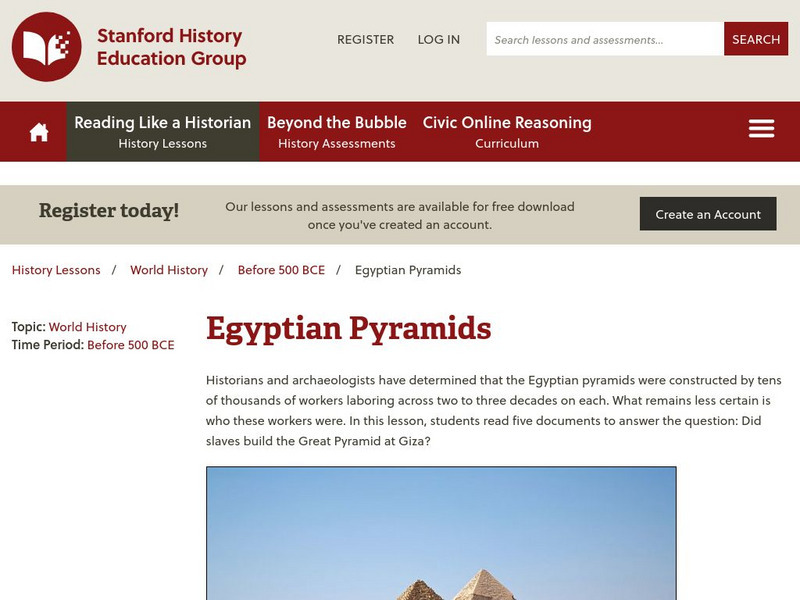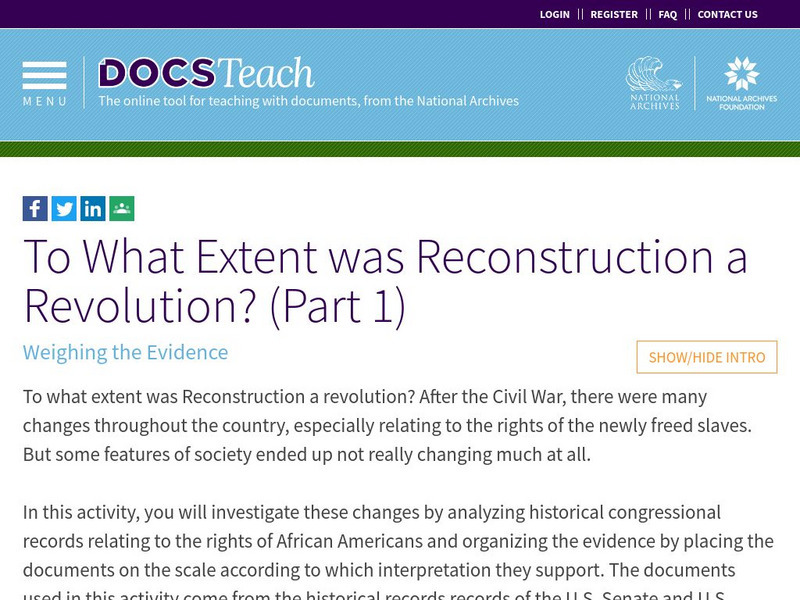Other
Do History: Using Primary Sources
This site explains the difference between a primary and secondary source. It also provides students with questions to ask when gathering evidence about a primary source document.
Stanford University
Stanford History Education Group: Roman Republic
[Free Registration/Login Required] Lesson using primary resources in which students investigate how democratic the Roman Republic was. Includes downloads for student materials, teacher mateials, PowerPoint, and original sources.
Library and Archives Canada
Nlc: Defining Primary and Secondary Sources
Libraries and archives hold documents and books that can be used for your research projects. Learn how to divide and identify them into primary and secondary sources in this tutorial.
Stanford University
Beyond the Bubble: History Assessments
[Free Registration/Login Required] A collection of innovative assessments, interactive rubrics, and annotated samples of student work with an emphasis on primary source documents for the use in a wide range of history concepts.
Stanford University
Sheg: Document Based History: Reading Like a Historian: Pocahontas
[Free Registration/Login Required] Young scholars use primary source documents to investigate central historical questions. In this investigation, students use evidence to explore whether Pocahontas actually saved John Smith's life and...
Stanford University
Sheg: Document Based: Reading Like a Historian: Declaration of Independence
[Free Registration/Login Required] Students use primary source documents to investigate central historical questions. In this investigation students weigh contrasting interpretations by prominent historians to answer the question: Why...
Stanford University
Sheg: Document Based History: Reading Like a Historian: Chicago Race Riots
[Free Registration/Login Required] Students use primary source documents to investigate central historical questions. In this investigation, students deliberate the origins of the Chicago race riots by exploring five documents that...
Stanford University
Sheg: Document Based History: Reading Like a Historian: Ibn Battuta
[Free Registration/Login Required] Lesson using primary resources on Ibn Battuta includes lesson plan, PowerPoint, graphic organizer, and original documents.
Curated OER
Mc Graw Hill: Key Ideas and Details: Use Text Evidence
Learn how to analyze primary and secondary sources using text evidence. An example is provided. (Note: Exercises don't load in archived copy.)
Stanford University
Sheg: Document Based History: Reading Like a Historian: The Puritans
[Free Registration/Login Required] Young scholars solve a problem surrounding a historical question by reading primary source documents. This historical inquiry lesson allows students to source, corroborate, and contextualize speeches...
Stanford University
Sheg: Document Based History: Reading Like a Historian: Salem Witch Trials
[Free Registration/Login Required] Students read primary source documents to solve a problem surrounding a historical question. This document-based inquiry lesson allows students to use four historical sources to build a more textured...
Roy Rosenzweig Center for History and New Media
Teaching History: Interactive Historical Thinking Poster (Secondary)
This is an interactive historical thinking poster. History is an argument about the past. Constructing a narrative about history involves several tasks: Analyzing Primary Sources, Examining Source Information,Using Evidence to Support...
PBS
Pbs Learning Media: Election Central 2016: Elections Throughout History
This link from the Election Central 2016 website focuses on elections throughout history with the use of primary source documents such as campaign posters, newspaper headlines, and video clips from various Presidential elections...
US National Archives
National Archives: To What Extent Was Reconstruction a Revolution? (Part 1)
Should Reconstruction be viewed as a revolution or not? Using primary source documents, students can weigh the evidence and come up with their conclusion. This lesson can be used as a whole class, small group, or individual activity.
New Deal Network
New Deal Network: Franklin and Eleanor Roosevelt Institute: Dear Mrs. Roosevelt
Resources and lesson plans concerning the thousands of letters Mrs. Roosevelt received from young people asking for help during the Depression. Students learn how to use primary source documents.
Stanford University
Stanford History Education Group: Egyptian Pyramids
[Free Registration/Login Required] Lesson on the Egyptian Pyramids in which students use primary resources to determine who the workers were that built the pyramids. Lesson plan, PowerPoint and original documents included.
Choices Program, Brown University
Choices: Teaching With the News: Debating u.s. Drone Policy
Comprehensive learning module from which students use multi-media resources, including video, graphic organizers and primary source material, to explore U.S. policy and the use of drones. Cooperative and independent learning features.
Jamestown-Yorktown Foundation
History Is Fun: Jamestown: Lesson Plan: How Do We Know What We Know?
This cross curriculum lesson plan encourages independent thought and investigation as students examine images related to the cultures that combined at Jamestown settlement. Encourages the use of art to understand history. An informative...
Energy for Sustainable Development
Esd Bulgaria: Kids & Energy: Electricity
Electricity is the flow of electrical power or charge. It is a secondary energy source which means that we get it from the conversion of other sources of energy, like coal, natural gas, oil, nuclear power and other natural sources, which...
US National Archives
Docsteach: Apollo Soyuz: Space Age Detente
In July 1975, the first joint Soviet-American spacecraft docking took place. In this activity, learners will analyze the way that government officials in both the United States and the Soviet Union valued space exploration for more than...
US National Archives
Docsteach: To What Extent Was Reconstruction a Revolution? (Part 1)
Students will examine several historical congressional records from the Reconstruction period to assess whether they show evidence that the Reconstruction period of American history should or should not be viewed as a revolution. The...
PBS
Pbs Learning Media: Mark Twain: Storyteller, Novelist, and Humorist
By examining two primary source activities and a short video, students will learn how this literary icon used humor and a uniquely American voice to chronicle post-Civil War life in the United States.
US Holocaust Memorial Museum
U.s. Holocaust Memorial Museum: The Nuremberg Trials and Their Legacy
How do you bring justice to the millions of people killed in German concentration camps? The Nuremberg Trials attempted this challenge. Study how SS officers were put on trial and punished using the following primary sources. Included...
Other
Wiwhc: Documenting Women's Lives Anglo Saxon England
Interesting activity using excerpts from a variety of primary sources to have students draw conclusions about the lives of women in Anglo-Saxon England.
